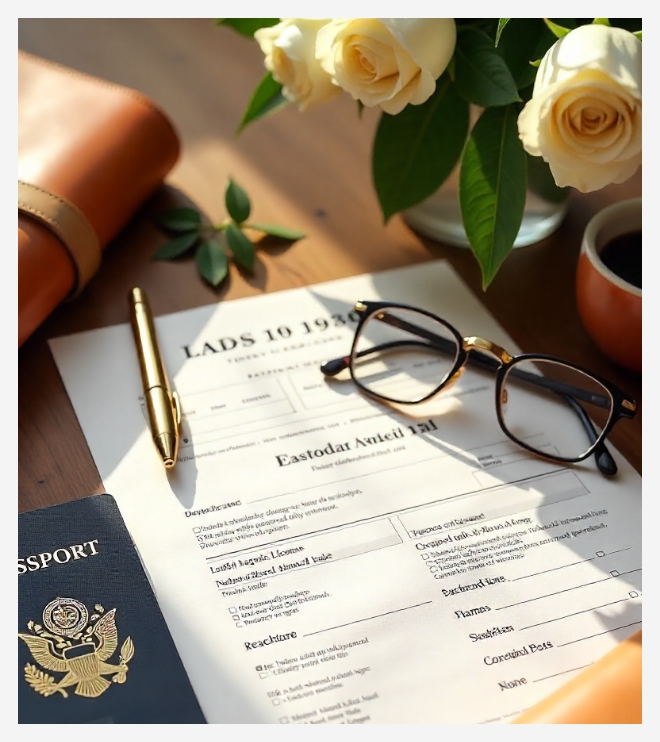Topics
A wedding in Santorini. Vows exchanged under a Tuscan sunset. A pheras ceremony in the
balmy breeze of Bali. For Indian couples dreaming of a wedding away from home, the idea
is no longer far-fetched—it’s wonderfully possible. But amid all the Pinterest boards
and
planning marathons, there’s one area that gets sidelined far too often: the legal aspect
of
ge ing married abroad.
It’s easy to be swept up in the magic of destination weddings. But love alone can’t get
your marriage certificate signed. Before you pack your lehenga and book that clifftop
mandap, it’s essential to ask: Is my wedding going to be legally valid? Because when the
music fades and the guests return home, what really stays is your marital status—
recognized not just by your families, but also by the law.
The Not-So-Glam Side Of Dream Weddings with Marriage Laws
Indian weddings are known for their
grandeur, emotion, and intricately woven
traditions. When you take this celebration
to a foreign destination, you’re adding a
layer of excitement—and a fair bit of
complication. Each country comes with its
own marriage laws, and these laws don’t
bend to your dream of a Bollywood-style
beach wedding.
While the photos might be stunning, many
couples forget to check if the place they’ve
chosen even allows foreign nationals to
marry without residency. Some require you
to be in the country for days or even weeks
before the ceremony. Others ask for local
documentation, translations, or even
religious certificates. Skipping these details
might leave you with nothing more than a
symbolic celebration—beautiful, yes, but
legally toothless.

Key Things To Keep In Mind Before You Commit
Planning a destination wedding as a
couple means thinking beyond the
aesthetics and location appeal. Here are
some core aspects you must consider to
avoid costly surprises or legal headaches
later.
First, check the marriage laws of your
chosen destination. Some countries allow
foreigners to marry with minimal
paperwork, while others may ask for
residency or lengthy procedures.

Second, factor in the timeline. Certain destinations require legal documents to be
submi ed weeks in advance. You may even need to be physically present in the country
before the ceremony date, and that could affect your travel plans or leave balance from
work.
Third, budget for legal expenses separately. This includes translation, notary services,
embassy a estations, and sometimes hiring a local a orney who understands the process.
These hidden costs can sneak up if not planned for early.
Fourth, ensure both families are on board culturally and legally. Especially for
traditional
weddings abroad, involving rituals and religious ceremonies, the line between spiritual
and
legal marriage can blur. Clarify with family members that a beautiful ceremony doesn’t
always mean a valid marriage in the eyes of the law.
Fifth, check the legal status of your ceremony in India. Will the certificate be valid
here?
Does it require a estation or re-registration? Some countries issue marriage
certificates in
their local language, which then need to be translated and apostilled for Indian use.
And lastly, keep an eye on your guest list and their travel documentation. If key family
members don’t have passports or visas, you might end up compromising on who can a end
the most important day of your life.
These aren’t just boxes to tick—they’re essential steps that ensure your destination
wedding is more than just photogenic; it’s also protected by law.
Religious Ceremony Vs Legal Marriage: Know The Rules & Laws
A mistake many couples make is assuming that their religious ceremony automatically
equates to a legal marriage. That’s often not the case. A Hindu wedding by the ocean in
Thailand or a Sikh ceremony in a French château may hold deep cultural and emotional
value, but if it’s not registered with the local authorities, it may not be recognized
by
Indian law—or the law of the land where it was performed.
Legal recognition comes only after the civil process is followed as per the rules of
that
country. The religious or cultural ritual is symbolic unless it’s accompanied by—or
followed
by—a government-recognized civil registration. So while your family priest might
officiate
your ceremony, it’s the local registrar’s stamp that gives your marriage legal teeth.
What Indian Law Says About Marriages Abroad
Indian law does recognize marriages that
are legally performed abroad, as long as
they follow the laws of that particular
country and do not violate Indian public
policy. That’s where the fine print kicks in.
If you don’t go through the legal process
in the host country—or don’t get the
required documents a ested—you might
face issues back in India.
In order for your foreign marriage
certificate to be valid in India, it often
needs to be a ested by the Indian
embassy or consulate in that country. In
many cases, additional steps such as
notarization, apostille (a form of
international verification), or certified
translation into English are required.
Without this, your marriage could be
considered invalid for legal procedures
such as obtaining spousal visas, filing joint
taxes, or even applying for a bank loan as
a couple.

The Paper Trail Begins Before You Say “I Do”
To legally marry in another country, you’ll likely be asked to provide a stack of
paperwork.
This may include valid passports, birth certificates, proof of address, and a “No
Objection
Certificate” (NOC) issued by the Indian government. If you’ve been married before, you
may also need a divorce decree or a death certificate in case of widowhood.
Some countries require these documents to be translated into their official language.
Others may demand them to be certified by a local notary or validated by their own
foreign affairs office. The timeline ma ers, too—many destinations need this paperwork
to
be submi ed weeks or even months in advance. The process is tedious but critical.
Missing
a single document or deadline can derail your plans, no ma er how extravagant your
venue or how meticulously planned your events.

Should You Register It There, Or Back In India? Considering Visa Rules
Here’s the big decision every couple needs to make: do you want your wedding to be
legally recognized in the destination country itself, or would you rather have the
celebration there and handle the legal part in India?
Many couples choose to have a ceremonial wedding abroad—without the civil registration
—and then get married under the Special Marriage Act once back in India. This provides a
legally secure alternative without dealing with foreign bureaucracy. However, keep in
mind
that the Special Marriage Act requires a 30-day public notice period in India, during
which
objections to the marriage can be raised.
If you do want your wedding to be legally binding in the destination itself, you’ll need
to
comply fully with local laws. That includes fulfilling residency requirements (if any),
submi ing documents ahead of time, and possibly appearing before a local registrar. Once
completed, the marriage certificate must then be legalized for Indian use.
Mixed-Nationality Marriages Come With Added Layers
If one of the partners is a foreign national,
the process becomes even more complex.
Multiple embassies may be involved. Both
sets of legal requirements need to be met.
Documents may need to be sourced from
more than one country, and each may have
different rules about translation,
notarization, and validation.
In such cases, it’s best to start early and
consult a legal expert in both countries. While
this might sound overwhelming, proper
planning can turn the process into a smooth,
manageable sequence of steps. Skipping this
could lead to problems later with visas,
inheritance rights, or even insurance claims.

After The Wedding, Don’t Forget The Follow-Through
After The Wedding, Don’t Forget The Follow-Through
Whether you get married legally abroad or handle it in India, some form of post-wedding
legal work is always involved. If your marriage took place abroad and was legally
registered, make sure the certificate is recognized in India. That might involve embassy
a estation, apostille authentication, or even a sworn affidavit stating the marriage
occurred.
For couples who got married abroad only ceremonially and plan to register in India
later,
prepare for the 30-day notice requirement, submission of identity proofs, residence
verification, and witnesses. This isn’t something you want to do last-minute while
unpacking your honeymoon bags.
Summary: Bliss, Backed By The Law
A destination wedding is more than a location—it’s a statement of your love story. But the story deserves a solid foundation. PerfectlyWed advises couples to plan early, understand both local and Indian legal requirements, and manage paperwork meticulously. By doing so, your destination wedding is not just magical, but meaningful—ensuring your union is legally, emotionally, and beautifully committed.



